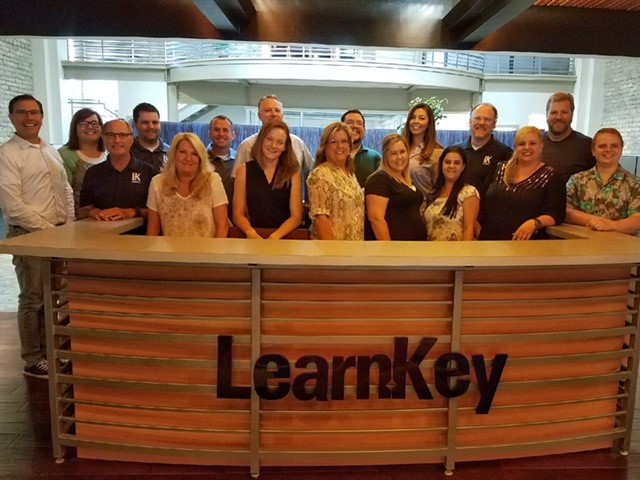
LearnKey Blog
Newest Key Contributor Award Recipient – Makes his passion drive Improving Employability Every Day
I am pleased to announce our 2017 2nd Quarter Key Contributor Award goes to Brian Tremelling. He has shown us from the beginning over 8 years ago that when you believe in something, most importantly yourself, dreams can come true. This award is a big deal for our company as it is given to those that really demonstrate our core values: Ease, Value, and Trust, as well as our “Why” which is Improving Employability Every Day.
One of Brian’s most proud accomplishments is how he led the way in building our vocational rehab programs, but what you don’t see is his passion, commitment, and dedication to the stuff that is not fun. Building course bundles, creating and automating process flows, dealing with the internal and external challenges that come when you are focused on progressing our students so they reach their employability goals. However, this past quarter, in addition to managing the program, getting us approved in other states, and 110% dedicated to improving our process and technology, to make other jobs easier he alone took on technical work in order to enhance our student information system (SIS). The entire team got a sneak peak at it three weeks ago and are so excited to roll it out. We are close, very close – Brian led that cause and through bumps and roadblocks he handled it like a pro!
His peers were excited to hear what former Key Contributor Award Winners had to say about Brian:
Jason Manibog says Brian is a great organizer, always helping production, and always has the students’ best interest in mind. Wyett Ihler shared: “I am impressed with Brian’s dedication and ability to stick to something when he has a belief. That passion has served us so well. Willing to assert but does so in a very respectful manner.” Ben Lee: “Brian is a great friend who always tries to understand/listen to the people he works with. Doesn’t give up when he believes in something.” Tristan Roberts: “Brian Keeps an open mind and always receptive to change for the better of the student and LK. Always gives an honest opinion.” Kim Johnson: “Astounded by vast knowledge base, curricula, team player, always has the best interest of LearnKey.”
So you hear: Passion, belief, team player, good listener, honest, respectful. I’d like to second all of those as he and I will always be tied together for dealing with our fair share of challenge, opportunities, and positive outcomes. He reconfirmed that if you do the right thing, things have a way of working out.
Please join me in once again congratulating Brian on his many contributions to LearnKey!
Introduction to Remote Year
In July 2017 I decided to share an exciting adventure with my LearnKey family. Here is the story.
In my first two years with LearnKey, I have created a Job Ready Team from nothing, managed over 50 veterans’ successful placement in careers and assisted with strategic initiatives…. All while learning the ins and outs of the IT field and training myself to be efficient and productive at home, which in theory sounds awesome, but when you are a social butterfly (as my parents say) it can pose a bit of a challenge.
The first year, I was distracted by negative questions like, “am I doing enough?” “can I do laundry during work hours, or is that illegal (I can be a bit dramatic)?”, “do people remember that I even work here?” I felt like I was doing something wrong if I wore pajamas or workout clothes all day, I mean no one saw me, right?! This negative self-talk can be detrimental to productivity especially when you do not have the physical support of your peers and coworkers. However, one day, with the simplest conversation with someone who worked remotely, and who I admired, my work from home life changed.
I was at lunch with a mentor that I revere, a woman that has it ALL together, inspires others to persevere and does it with the utmost grace and integrity. She said to me, “do you ever take an early meeting without brushing your teeth?” – or something to that effect. OMG! YES! I was overcome with excitement, like a child that can only express the excitement with a squeal. This woman, perfect, powerful, professional, sometimes does not have time to brush her teeth before a meeting!! I was not alone. I did not have to be perfect. I had to be productive. And I was.
From that day on, I hit my stride working from home. I developed new processes, assisted massive amounts of students with resumes/job searching/and interviews, often in leggings and a tank top. I made sure I brushed my teeth BEFORE every meeting! I was killing the game.
At that point, I decided I needed a new challenge. I presented my Remote Year program to Jeff, the coolest CEO you could meet. His progressive mindset and passion to change the world fueled his approval of the program. To travel the world for a year… and work. Because of the two years I had been working remotely, and the accomplishments I have, Jeff said yes. This month, July 2017 – I shared the program with my LearnKey family. And with little shock, as the team is comprised of the most genuinely, supportive, creative and all around amazing people I have encountered, they approved of my adventure as well.
Now, I HAVE to go through with this. I have no choice. Nervousness excitement is the simplest way to describe what I am feeling. But it’s more like an emotional roller coaster of EVERY AND ALL feelings you have ever felt. I hope I do not disappoint my team. I hope I can find good food. I really, really, really hope my Internet connection does not fail me in Thailand, or Prague, or Colombia! I hope I can afford shopping in every country. I hope people like me. With lots of hope, excitement, nervousness, and dedication, I embark on my journey January 2018. This blog is meant to inspire, relate to other remote workers, and hopefully make you smile. Until next month!
To learn more about Remote Year, please visit their website: https://remoteyear.com/
Photo: St. George Office Team
Programming in C# Course Released!
Today, we are excited to announce the release of our Programming in C# course.
LearnKey’s Programming in C# course is geared toward those who have some programming experience and are looking to improve their employability prospects for jobs requiring intermediate C# knowledge. The course is also geared toward those looking to take and pass exam 70-483, a Microsoft Certified Professional-level exam. 70-483 is one exam that leads toward the MCSA: App Builder certification. Specifically, this C# course covers managing program flow, creating and using types, debugging applications, implementing security, and implementing data access.
Our hope is that through our courseware we may provide learners with the guidance, preparation, and skills they need to succeed. For more information and to learn about additional LearnKey products visit our website.
Next Up on the Programming Track: Programming in C#
Greetings, one and all. Every once in a while, I’ll step on a golf course that says, “recommended handicap of 15 or lower for the championship tees.” For you non-golfers, this means that one should have decent skills before taking on the challenge of playing a golf course from a challenging set of tees. Those who aren’t quite there should play from the regular tees, as this will (in theory) make their day more enjoyable.
In some respects, this metaphor applies to our upcoming Programming in C# course, which ties to the Microsoft 70-483 exam, Programming in C#. A lot of what we do for courses is geared toward the MTA certifications, which are terrific for first-level certifications. This course isn’t one of them. This and other MCP (Microsoft Certified Professional) courses assume you have some programming experience, or the equivalent therein. Does that mean that if you are brand new to programming, you shouldn’t take this course? Absolutely not. But, you should take the Introduction to Programming course and maybe the Introduction to Programming using Python course (also coming out soon) to get some experience working with a programming language. Oh, by the way, that language I said in the Introduction to Programming course we use that I wouldn’t reveal then? It’s C#. So that course is helpful for C# knowledge as well.
In this Programming in C# course, there are four main topics:
- Managing Program Flow
- Creating and Using Types
- Debugging Applications and Implementing Security
- Implementing Data Access
Not only do these map to the 70-483 exam, these are topics that are essential for improving your employability prospects in the programming field. You can take what you learn here and apply it to other programming languages as well. So, for those of you who have a little experience and are looking to take your skills to the next level, this will be a good spot for you indeed.
As to whether my golf game is good enough for those signs that tell you what tees to play from, well, my handicap number isn’t for public consumption, but I’ll just say I usually play from the championship tees. I like a good challenge.
Animate CC Course and Workbook Released!
Today, we are excited to announce the release of our Animate CC course.
LearnKey’s Animate CC course covers topics such as, setting project requirements, understanding rich animated media, the Animate program, creating rich animated media content using Animate, and testing and publishing these documents. Mapped to cover the exam objectives for the Animate CC ACA exam, this course will improve the employability prospects for anyone looking for work requiring skills in developing rich animated media through Animate.
Our hope is that through our courseware we may provide learners with the guidance, preparation, and skills they need to succeed. For more information and to learn about additional LearnKey products visit our website.
Timing is Everything – A Programming Track Update
A hearty summer greetings to you from your humble senior instructor. I have occasionally brought to you in this blog space some news about our new programming track. Well, it has officially started with last month’s release of the Introduction to Programming course, which is a course that focuses mainly on programming and design concepts.
Now, about the “timing is everything” part. In building this programming track, we were (or at least I was) trying to come up with a way to bridge the Introduction to Programming courses to some of the existing Microsoft MCSA Certifications, which are more geared for those with 1-2 years of experience in programming (or possess equivalent knowledge). And, a great percentage of you looking to explore this programming track are probably new to programming (hence the Intro to Programming course).
All that said, Microsoft is rolling out, over the next few months, four new MTA (Microsoft Technology Associate) certifications. They are:
- Exam 98-381: Introduction to Programming using Python
- Exam 98-382: Introduction to Programming using JavaScript
- Exam 98-383: Introduction to Programming using HTML and CSS
- Exam 98-388: Introduction to Programming using Java
These courses/certifications are the perfect gap between the Introduction to Programming course and the MCSA and other advanced courses we have for our programming track, which we are rolling out over the next several months. And, these courses fit in nicely with our three programming tracks: Web Development, Mobile Development, and General Languages. They mold so well, we even built a road map for you, which you will find a link to at the end of this blog.
Over the next several weeks, I will be posting blog entries for each of the courses in the programming track we are releasing this year.
You see, timing is everything.
Oh, that link: https://www.learnkey.com/careertracks/programming_and_development
Entrepreneurship and Small Business Course Released!
Today, we are excited to announce the release of our Entrepreneurship and Small Business course.
Entrepreneurship and Small Business
LearnKey’s Entrepreneurship and Small Business course is designed to prepare a student to sit for the Entrepreneurship and Small Business certification exam. The course provides scenarios and example questions to apply knowledge of fundamental entrepreneurship and small business management concepts. Topics covered include: defining an entrepreneur, recognizing an opportunity, starting and operating a business, how to market a business, managing sales, and basic financial management. The course is designed for a student who has taken a small business management class, but will prepare any student for the ESB exam.
Our hope is that through our courseware we may provide learners with the guidance, preparation, and skills they need to succeed. For more information and to learn about additional LearnKey products visit our website.
MTA Security Fundamentals Released!
Today, we are excited to announce the release of our MTA Security Fundamentals course.
MTA Security Fundamentals (98-367)
LearnKey’s MTA Security Fundamentals course is geared toward those looking to learn basic operating system security fundamentals. This course will also prepare students to take and pass the MTA Security Fundamentals exam (98-367). The four main topics covered in this course are: security layers, operating system security, network security, and security software. This course will also improve employability prospects for those trying to gain an entry-level IT support/desktop position with some basic security knowledge requirements.
Our hope is that through our courseware we may provide learners with the guidance, preparation, and skills they need to succeed. For more information and to learn about additional LearnKey products visit our website.
Introduction to Programming Concepts and QuickBooks 2017 Courses Released
Today, we are excited to announce the release of our Introduction to Programming Concepts and QuickBooks 2017 courses, and the Access 2016 MasterExam.
Introduction to Programming Concepts
This 90-minute course is an introduction to basic programming concepts and is perfect for those who want to learn how to program, but don’t know where to start. Rather than focusing on a single programming language, this course will teach prospective programmers three basic principles: introduction to objects, program design basics, and coding basics.
LearnKey’s QuickBooks 2017 course is designed to improve the employability prospects for any company needing someone who can work with QuickBooks efficiently. The course also serves as a preparation for the QuickBooks Certified User Exam. The course goes through all ten exam domains: QuickBooks Setup, General Product Knowledge, List Management, Items, Sales, Purchases, Payroll, Reports, Basic Accounting, and Customization. This course will give users the confidence to work effectively with QuickBooks for businesses of all types.
LearnKey’s Microsoft Access 2016 MasterExam will help you prepare to take exam 77-730. This educational training product is intended to be used in combination with LearnKey’s video courseware. The MasterExam has hundreds of questions to test your knowledge, helping you become a certified user of Access 2016.
Our hope is that through our courseware we may provide learners with the guidance, preparation, and skills they need to succeed. For more information and to learn about additional LearnKey products visit our website.
CEO Gets “Belted” By Senior Instructor
I have an impeccable wardrobe. Not impeccable as in perfectly tailored suits, mind you. It is impeccable in that it is perfect for the business casual work environment at LearnKey and for my second home, the golf course.
I’m talking specifically about my belt collection. Yes, I have a brown belt and a black belt like most guys do, but, I also have white, silver, mocha, purple, deep purple, navy, light blue, green, lime, neon, orange, and red belts. I even have a white/blue two-tone belt which reverses to a black belt. Snazzy, huh? Most of my co-workers are very complimentary of my wardrobe. They know good taste when they see it.
I said most because our fearless CEO, Jeff Coruccini, for the longest time failed to see the light on my colorful belts. Every time he flew up, he flat ridiculed my belts. This after I made it a point to make sure he always saw a new one for several straight trips. Spending 15 years in classroom training before coming here two years ago, I learned to read people well, so where I heard ridicule from Jeff, I felt a sense of his wishing he could pull off the look I pull off so effortlessly.
Like me, Jeff likes to get out for a frequent trip around the golf course. He recently had a birthday approaching. So, I asked his wife, Lori, “Hey, what does Jeff wear to the golf course?” Her response, “Black or white shirt and tan shorts. Nothing too exciting.” How sad, I thought. So, while Jeff was up here this week making the rounds, I had a care package sent to him. He made it home, found the box, and here my friends, is a very happy man with the start to what I am sure will be a most impressive belt collection:
Just look at the joy on his face knowing that one day, he will have that impeccable wardrobe, just like I do.
So, what does this have to do with employability and certifications and a workplace in general? Actually, there is a point here: We here at LearnKey work hard, very hard, to create the best possible courses we can to improve employability and certification prospects for all of you. But in all that hard work, we allow for fun. We allow for laughing at ourselves and with each other. And just having that attitude about life will make you more employable…every day. And, you will enjoy life that much more.


